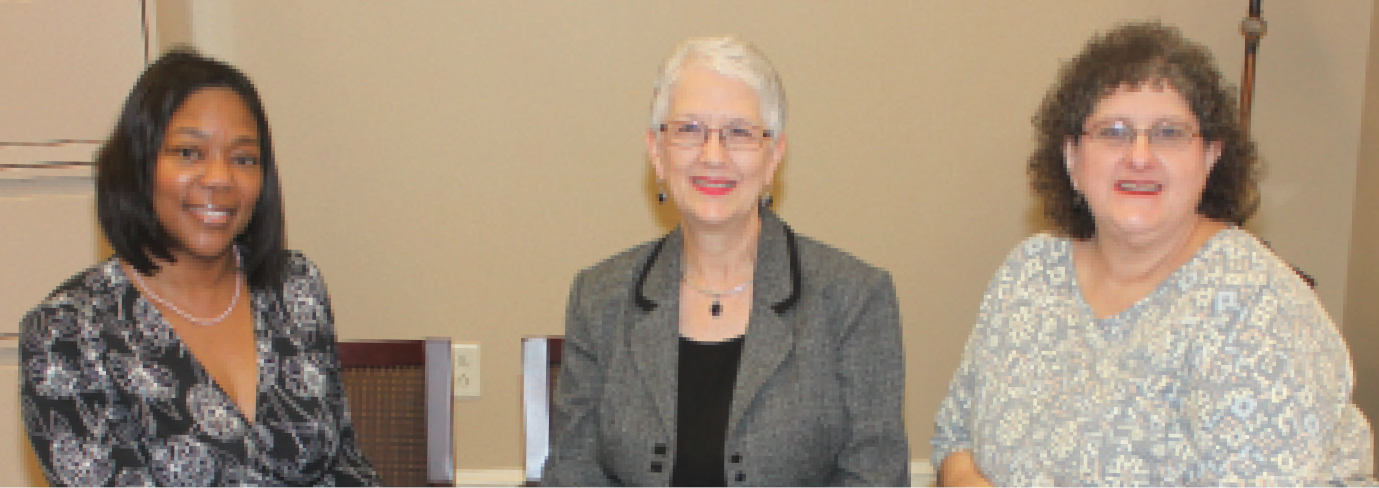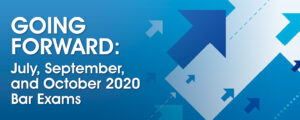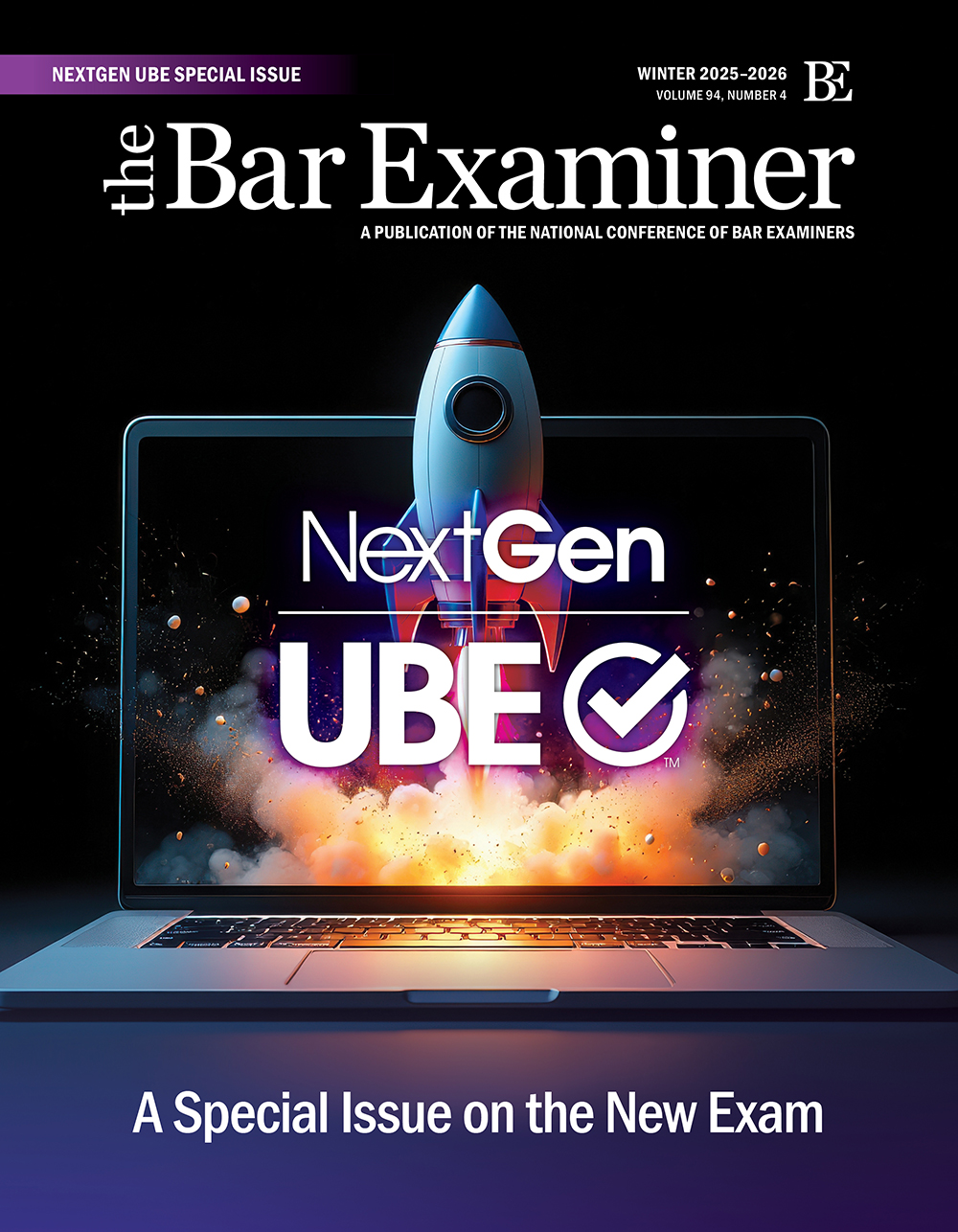This article originally appeared in The Bar Examiner print edition, Fall 2020 (Vol. 89, No. 1), pp. 79–87.
News
NCBE Virtual Events
Rule Changes
California
On July 16, 2020, the California Supreme Court issued an order permanently reducing the cut score for the California Bar Examination from 145 to 139.
Indiana
On December 11, 2019, the Indiana Supreme Court Study Commission on the Future of the Indiana Bar Examination issued a report containing its findings and recommendations. Among the recommendations was a resolution, unanimously adopted by the Indiana State Board of Law Examiners on November 15, 2019, supporting the adoption of the Uniform Bar Examination in Indiana, “if accompanied by a high-quality Indiana law-specific component.” The report also recommended that Indiana retain its current passing score of 264 and its scaling and grading practices.
Kentucky
On August 14, 2020, the Supreme Court of Kentucky adopted the Uniform Bar Examination (UBE). The first administration of the UBE in Kentucky will be in February 2021, and the minimum passing score will be 266.
Minnesota
The Minnesota Supreme Court issued an order effective April 1, 2020, extending eligibility for admission by MBE score from 24 months to 36 months, permitting concurrent applications for admission by UBE score, and expanding the types of emergency situations that qualify an applicant to carry fees over to the next examination. The emergency situations now include “medical emergency, death in the family, or similar exceptional circumstances.”
Nebraska
Nebraska finalized its admission rule revision proposal, and the following changes were approved by the Nebraska Supreme Court and became effective in February 2020:
- There is now a four-exam limit in Nebraska; an applicant who has failed four bar exams in any jurisdiction or combination of jurisdictions is prohibited from sitting for the bar exam in Nebraska.
- Character and fitness determinations are reserved until after the exam. Applicants will be given a preliminary permission to sit for the bar exam, but final character and fitness determinations are reserved to deal with any issues that may arise at the exam.
New Hampshire
On June 19, the Judicial Branch of the State of New Hampshire announced that New Hampshire had removed from its bar application any questions about mental health history, diagnosis, or treatment. The New Hampshire Supreme Court Committee on Character and Fitness was persuaded that the questions discouraged law students and others from seeking necessary treatment for mental health and substance abuse problems when such services are critical to student well-being. The committee will continue to inquire about applicant conduct, which “has always been the primary focus of the court and committee’s inquiries into character and fitness and, even with these changes, will remain so.”
New Mexico
On July 31, the New Mexico Board of Bar Examiners approved the discontinuation of courtesy seating at New Mexico bar examinations, beginning with the February 2021 exam.
Oklahoma
On June 8, 2020, the Supreme Court of the State of Oklahoma adopted the Uniform Bar Examination (UBE). The first administration of the UBE in Oklahoma will be in July 2021, and the minimum passing score will be 264. The Court also increased the minimum passing score for the Multistate Professional Responsibility Examination (MPRE) in Oklahoma to 80 effective January 1, 2022.
Washington
On June 4, the Washington Supreme Court voted to sunset its Limited License Legal Technician (LLLT) program. The Court also rejected the LLLT Board’s requested expansion of practice areas and proposed rule revisions. After careful consideration of the overall costs of sustaining the program and the small number of interested individuals, a majority of the Court determined that the LLLT program was not an effective way to increase access to legal services. Current legal technicians in good standing may continue to be licensed and to provide services, and individuals already in the pipeline who complete the requirements to be licensed by July 31, 2021, may do so. No new LLLTs will be admitted after that date.
On July 10, the Court made two modifications to its June 4 decision:
- The substantive law-related work experience requirement for licensing was reduced from 3,000 to 1,500 hours.
- Candidates who have met all other requirements by July 31, 2021, will have until July 31, 2022, to complete their substantive law-related work experience under the supervision of a lawyer.
People
Hawaii
In 2019, Hawaii’s two bar examination technicians, Koreen Yogi and Susie Nakahara, retired. Their positions have now been filled by Krisette Chinen and Relene Tanaka.
Kentucky
Elizabeth S. (Beth) Feamster retired from the position of Director and General Counsel for the Kentucky Office of Bar Admissions at the end of March 2020 after over seven years of service. Valetta H. Browne was named to fill the position, effective April 15.
Louisiana
The new chair of the Louisiana Committee on Bar Admissions is Larry Feldman, Jr., Esq., who was formerly the Director of Character and Fitness. The new Director of Character and Fitness is Celeste Coco-Ewing, Esq., who was formerly a member of the character and fitness panel. Monique R. Drake, Esq., formerly the Attorney for Character and Fitness, is now Executive Director of the Louisiana Committee on Bar Admissions, and Megan O’Cain, Esq., formerly the Assistant Attorney for Character and Fitness, is now the Testing Director.
Minnesota
The Minnesota Supreme Court has appointed Cheryl Prince, a shareholder at Hanft Fride in Duluth, Minnesota, to serve on the Minnesota State Board of Law Examiners for a three-year term ending December 31, 2022.
Mississippi

Linda Knight, retired Bar Admissions Administrator for the Mississippi Board of Bar Admissions (center); Interim Bar Admissions Administrator Wendy Smith (left); Bar Admissions Administrative Assistant Denise Ricketson (right)
On April 9, 2020, Linda Knight retired after 38 years of service as the Bar Admissions Administrator to the Mississippi Board of Bar Admissions. Knight served as chair of the Council of Bar Admission Administrators (CBAA) for the 2004–2005 term and was recognized by the CBAA in 2008 for her outstanding service to the bar admissions community. She also served from 2000 to 2006 on the NCBE Character and Fitness Committee. Wendy Smith has been appointed to serve as the Interim Bar Admissions Administrator.
New York
On September 2, 2020, Diane F. Bosse retired as the chair of the New York State Board of Law Examiners after 22 years as a member of the Board, 19 years of which she served as chair. (See a tribute to Bosse here.)
Pennsylvania
Two new members of the Pennsylvania Board of Law Examiners began their three-year terms on April 1, 2020. Benjamin Shein, Esq., of Shein Law Center in Philadelphia, is a renowned expert in mesothelioma and asbestos, and Michael Lutz, Esq., practices with the firm of McCausland Keen & Buckman in Devon, PA, in the areas of business, finance, and intellectual property law. Also on April 1, Gerald Lawrence and David Rasner ended their terms of service to the board.
Tennessee
William M. “Muecke” Barker, a former Chief Justice of the Tennessee Supreme Court who had joined the Tennessee Board of Law Examiners in 2015 after retiring from the bench, retired from the board in December 2019. Robert F. Parsley, a partner at Miller & Martin, PLLC, in Chattanooga, is the newest board member. Prior to joining the board, Parsley served as an Assistant Examiner, responsible for writing and grading essay questions for the former Tennessee Bar Examination.
Wyoming
Craig Newman has joined the Wyoming State Bar’s Character and Fitness Committee. Newman is an attorney in private practice in Casper, Wyoming. He is a former member and former chair of the Wyoming State Bar’s Board of Professional Responsibility and former member and former chair of the Bar’s Review and Oversight Committee, which oversees Bar Counsel. Newman received his JD from the University of Wyoming.
NCBE News
Board of Trustees
 Hulett H. (Bucky) Askew is the new chair of NCBE’s Board of Trustees. Askew has served on the Board since August 2012. Askew served as the Consultant on Legal Education of the American Bar Association from September 2006 until August 2012. Prior to that, he was the director of the Office of Bar Admissions of the Supreme Court of Georgia from 1990 to 2006. He also concurrently served as executive director of the Chief Justice’s Commission on Professionalism from 1990 to 1996.
Hulett H. (Bucky) Askew is the new chair of NCBE’s Board of Trustees. Askew has served on the Board since August 2012. Askew served as the Consultant on Legal Education of the American Bar Association from September 2006 until August 2012. Prior to that, he was the director of the Office of Bar Admissions of the Supreme Court of Georgia from 1990 to 2006. He also concurrently served as executive director of the Chief Justice’s Commission on Professionalism from 1990 to 1996.
Askew is a former member of the Council of the Section of Legal Education and Admissions to the Bar and served for six years on the Section’s Accreditation Committee. He also has been a member of the ABA’s standing committees on Legal Aid and Indigent Defendants, Professionalism, and Professional Discipline.
Askew was co-chair of the Access to Justice Committee of the State Bar of Georgia from 2002 to 2006. He currently serves as chair of the board of directors of Lawyers for Equal Justice in Atlanta, a law practice incubator program, and from 1997 to 2006 served as a member of the board of trustees of the Lawyers Committee for Civil Rights Under Law.
Marilyn J. Wellington and Arlene Y. Coleman are the newest members of NCBE’s Board of Trustees. Wellington, who joined the Board in February 2020, is the executive director of the Massachusetts Board of Bar Examiners. Coleman is in private practice with A.Y. Coleman and Associates Inc. and has served as a member of the Illinois Board of Admissions to the Bar since 2015; she joined the NCBE Board in August 2020.
NCBE and CLEO Extend Partnership to Better Diversify the Legal Profession
On July 16, NCBE and the Council on Legal Education Opportunity Inc. (CLEO) announced that they will renew and extend their partnership to increase diversity and inclusion in the legal profession.
The partnership, which launched in 2018, has been extended another three years, during which NCBE will contribute approximately $500,000 to continue funding the NCBE/CLEO Bar Passage Program, ensuring that CLEO students nationwide are able to receive consistent support throughout their three years of study.
The program is significant in that it allows mentors, as well as mentees, to be better connected by working with each other on a more consistent basis. Mentors will have a more in-depth understanding of students’ study habits, thereby allowing them to offer better guidance and tailored advice.
Through the Bar Passage Program, which was created as the result of the initial partnership between NCBE and CLEO, students receive coordinated training on strategies for success during law school offered by law professors with extensive experience in academic and bar support programming at their respective law schools.
CLEO students participating in the Bar Passage Program also gain access to hundreds of practice problems and review materials; in addition, they will have the opportunity to answer practice essay questions and receive custom feedback on their written work.
“This partnership with NCBE has empowered CLEO to design a bar program to help students know that they belong in the community of lawyers,” said Cassandra Sneed Ogden, chief executive officer of CLEO. “The NCBE/CLEO partnership is especially important to help CLEO realize its vision: that the United States legal profession is truly diverse, equitable, and inclusive, and that it effectively balances the scales of liberty and social justice for all.”
“Our partnership with CLEO is one of the most important efforts we have implemented to help young, diverse students reach their full potential in law school and prepare for the bar exam,” said NCBE president and CEO Judith Gundersen. “Diversity and equity are central to NCBE’s mission to promote fairness, integrity, and best practices in admission to the legal profession, and to our vision for a competent, ethical, and diverse legal profession.”
Modeled after the highly successful bar preparation program at Florida International University School of Law, the NCBE/CLEO Bar Passage Program was implemented in 2019. The program that year focused on 137 incoming law school students. Because the first year of law school is considered to be the most important, the CLEO Bar Passage Program is intended to help prepare entering students for what to expect going into law school.
Going forward, it is expected that the CLEO Bar Passage Program will potentially help 1,000 students through 2022.
NCBE Commissions Nationwide Survey to Better Understand Attitudes of the American People Toward the Bar Exam
In September 2020, NCBE worked with a national polling firm to gauge public opinion about the bar exam, including whether the public thinks that its would-be lawyers should be required to pass a licensing exam during a pandemic. The survey, representative of the adult US population, shows that the American people overwhelmingly support the requirement that law school graduates pass a bar examination before being allowed to practice law: four out of five Americans support an in-person or remote bar exam for law school graduates.
When asked how the bar exam should be administered during the COVID-19 pandemic, 60% of respondents support a supervised in-person bar exam with masks, social distancing, and compliance with all other local health guidelines during the pandemic. Nineteen percent (19%) support a bar exam that would allow for online or other remote testing. Just 1 in 20 (6%) favor eliminating the bar exam during the pandemic. Fifteen percent (15%) had no opinion.
When respondents were asked about the post-pandemic environment, support for the in-person bar exam increased to 70%. Fourteen percent (14%) favor offering the bar exam remotely once the pandemic passes. Just 5% support eliminating the bar exam requirement and allowing graduates from accredited law schools to be licensed to practice law.
Details of the survey are available at ncbex.org/news/national-survey-bar-exam/.
NCBE Virtual Events
Webinar: The 2020 Bar Exam: July, September, and October

164 attendees
In April 2020, NCBE began hosting a series of virtual events addressing bar admissions during the COVID-19 pandemic, beginning with an April 16 informational webinar for jurisdiction bar admission administrators and staff about the three in-person exam options for July and beyond in 2020.
CLEO/NCBE Webinar: Going Forward: July, September, and October 2020 Bar Exams

On April 23, 2020, NCBE co-hosted a webinar with the Council of Legal Education Opportunity (CLEO) for all third-year law students participating in a CLEO program who were planning to take the bar exam in 2020. Thirty-seven students attended the webinar, during which NCBE staff members and several jurisdiction representatives gave an overview of the three in-person exam administrations in 2020 and jurisdiction processes being followed.
NCBE/CBAA Weekly Roundtable

The virtual events then took the form of weekly roundtables. From April to July, NCBE held 10 roundtables for the Council of Bar Admission Administrators (CBAA) to discuss a variety of issues facing jurisdictions with administration of the bar exam during the pandemic.
Virtual Vision 2020 Webinar Series

With the cancellation of NCBE’s “Vision 2020” Annual Bar Admissions Conference, which had been scheduled for April 30 to May 3 in New Orleans, Louisiana, NCBE launched a Virtual Vision 2020 webinar series covering a few of the sessions that had been scheduled for the in-person event.
April 30 (justices only): Remote Proctoring and High-Stakes Exams (38 attendees)
Defining online testing/remote proctoring; identifying security and score validity risks; surveying other professions—what are they doing?; addressing examinee privacy concerns
- Mark Weinstein, JD, private practice legal counsel to testing organizations
- James Wollack, PhD, Professor and Chair, Educational Psychology Department, University of Wisconsin–Madison
June 10: The Line Between Diagnosis and Disability: Accommodations and Testing in the COVID-19 Era (128 attendees)
How a candidate’s diagnosis relates to the ADA and testing/proctoring accommodated candidates
- John Hosterman, PhD, Paradigm Testing
July 22: Mental Health and Well-Being in the Age of Coronavirus and Beyond (72 attendees)
How to maintain wellness and mental health during the pandemic and in the future
- Patrick Krill, Principal and Founder, Krill Strategies
Grading Workshops

The Grading Workshop, held the weekend after each July exam administration, was conducted virtually on August 1, followed by two additional virtual Grading Workshops on September 13 and October 4 following the two additional exam administrations offered due to the COVID-19 pandemic.
- August 1 (following the July 28–29 exam): 60 Zoom participants from 12 jurisdictions, 146 on-demand participants
- September 13 (following the September 9–10 exam): 20 Zoom participants from 6 jurisdictions, 27 on-demand participants
- October 4 (following the September 30–October 1 exam): 31 on-demand participants
Test Your Knowledge
MBE questions are written by
A. NCBE staff lawyers
B. Commercial bar preparation professionals
C. Bar examiners
D. Volunteer practicing lawyers, judges, and faculty members
Answer: D. MBE questions are written by the volunteer practicing lawyers, judges, and faculty members of NCBE’s seven MBE drafting committees (one for each subject). For more about how MBE items are written, see “The Testing Column: Writing, Selecting, and Placing MBE Items: A Coordinated and Collaborative Effort” in the Spring 2019 issue of the Bar Examiner.
Webinar: Charting a New Course for Diversity, Equity, and Inclusion
On October 21, NCBE offered a joint program of the NCBE Diversity & Inclusion and Education Committees that examined the impact and interdependence of our individual and collective roles in the pursuit of racial justice, representation, and equity.
Questions addressed by the three speakers during the webinar included the following: How do we actively advocate for the equity of others in our personal and professional lives? How do we create organizational change? How is the legal profession responding to the renewed call for social justice?
The webinar, which was attended by 130 members of the bar admissions community, consisted of three segments:
- Joseph Oteng, a second-year law student at the Michael E. Moritz School of Law at Ohio State University, was interviewed by Judge Juan Hoyos, Minnesota Fourth Judicial District, about his personal approach to social justice education.
- Merf Ehman, executive director of Columbia Legal Services, discussed examining the norms of an organization through the lens of the dominant social culture in order to identify and dismantle internal racism.
- James Leipold, executive director of the National Association for Law Placement (NALP), presented data on diversity in the legal profession and how social justice movements have motivated firms to enact policies and create positions to increase representation.
NCBE/CBAA 2020 Annual Meeting

The 2020 Annual Meeting of NCBE and the Council of Bar Admission Administrators (CBAA), which had been scheduled for August 6–9 in Kansas City, Missouri, was held virtually over a series of dates in July and August. The August meeting of the NCBE Board of Trustees, typically held during the same weekend, was held on August 7. The 11 CBAA committees met from July 21 to August 13, two plenary sessions were held in August, and the meeting concluded with the CBAA business meeting on August 14.
Plenary Sessions
August 5: Remote Exams Administered in July 2020: What Worked, What Didn’t, and Lessons Learned (81 attendees)
- Maribeth Graff, Executive Director, Michigan State Board of Law Examiners
- Christine Kenefick, Deputy Executive Director, New York State Board of Law Examiners
- Brian Kunzi, Director of Admissions, State Bar of Nevada
- Bradley Skolnik, Executive Director, Indiana Office of Admissions and Continuing Education
August 12: In-Person Exams Administered in July 2020: What Worked, What Didn’t, and Lessons Learned (96 attendees)
- Carole McMahon-Boies, Director of Admissions, Nebraska Supreme Court
- Dawn McKnight, Deputy Regulation Counsel, Colorado Supreme Court Office of Attorney Admissions
- Carol Smith, Bar Admissions Administrator, West Virginia Board of Law Examiners
- Andrea Spillars, Executive Director, Missouri Board of Law Examiners
Recognitions and Leadership Changes
The NCBE/CBAA Annual Meeting is the occasion at which a CBAA member is recognized for outstanding service to the bar admissions community. This year’s recognized CBAA member was Kathleen B. Harrington of Connecticut, outgoing CBAA chair and Deputy Director of Attorney Services for the Connecticut Bar Examining Committee, for her service in leading the CBAA during the COVID-19 pandemic.
The Annual Meeting also marks the change in leadership of the CBAA Executive Committee. Kathleen Harrington was recognized for her service on the Executive Committee during the past year, and Sahbra Jacobs, Counsel for the Committee on Character for the New Jersey Board of Bar Examiners, was welcomed as CBAA chair for the 2020–2021 term.
The August NCBE Board of Trustees meeting marks the change in leadership of the NCBE Board of Trustees. Hon. Cynthia L. Martin of Missouri, who has served on the Board since 2011, was recognized for her leadership during the past year. Hulett H. (Bucky) Askew of Georgia was welcomed as chair for the 2020–2021 term.
The August Board meeting is also the occasion at which a former NCBE chair is honored for exceptional service to NCBE; this year’s honoree was Margaret Fuller Corneille, who served on the NCBE Board of Trustees from 2005 to 2015 and as its chair from 2013 to 2014. Corneille has chaired NCBE’s Editorial Advisory Committee, which advises on content for the Bar Examiner, since 2018.
Contact us to request a pdf file of the original article as it appeared in the print edition.







